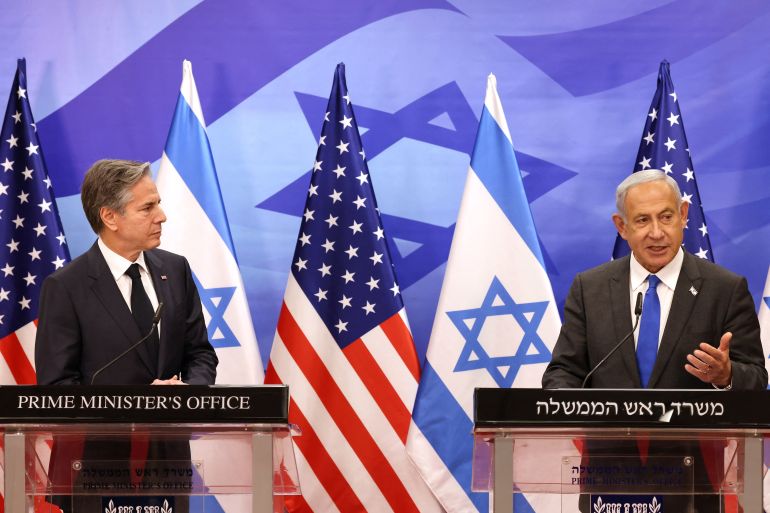Blinken urges calm, reaffirms ‘ironclad’ US support for Israel
Top US diplomat pays tribute to Israeli victims of attack in Jerusalem without mentioning Palestinians killed by Israel.

US Secretary of State Antony Blinken has called for “calm” and “de-escalation” between Israelis and Palestinians while reiterating Washington’s “ironclad” commitment to Israel.
In a joint news conference with Israeli Prime Minister Benjamin Netanyahu in Jerusalem on Monday, Blinken reaffirmed that the administration of US President Joe Biden will push forward with normalisation efforts between Israel and Arab states, to “integrate” the country into the region.
Keep reading
list of 3 itemsBlinken arrives in Egypt as Israeli-Palestinian tensions soar
Israel prepares to demolish family home of Palestinian gunman
In his first visit to Israel and the occupied Palestinian territories since Netanyahu’s far-right government took office late last year, the top United States diplomat also heaped praise on the US-Israel alliance.
“It’s important that the government and people of Israel know America’s commitment to their security remains ironclad,” Blinken said. “That commitment is backed up by nearly 75 years of United States support. America’s commitment has never wavered; it never will.”
His trip comes amid an eruption of violence between Israelis and Palestinians, with the Israeli military conducting near-daily, deadly raids in the occupied West Bank.
Last week, Israeli forces killed 10 Palestinians in the West Bank, including nine in the Jenin refugee camp. A day later, a Palestinian gunman fatally shot seven Israelis in a settlement in occupied East Jerusalem.
On Monday, Blinken paid tribute to the Israeli victims without mentioning Palestinians killed by Israel.
Despite the mounting tensions, Blinken’s remarks appeared to place emphasis on regional normalisation and countering Iran, over concerns about the Israeli-Palestinian conflict.
Blinken restated the US’s verbal support for the two-state solution, but he did not explicitly criticise Israel’s policies of expanding illegal settlements in the West Bank and East Jerusalem — territories that Palestinians seek as home to their future state.
“Anything that moves us away from that [two-state] vision is — in our judgement — detrimental to Israel’s long-term security and its long-term identity as a Jewish and democratic state,” Blinken said. “That’s why we’re urging all sides now to take urgent steps to restore calm, to de-escalate.”
Reporting from East Jerusalem, Al Jazeera’s James Bays said Blinken — who started his Middle East trip in Egypt on Sunday — is not expected to bring forward any major initiative to end the conflict.
“The Biden administration policy, ever since Joe Biden became president, has basically been to keep a lid on things, to urge restraint from both sides — but not get bogged down in any negotiations, not to actually proactively try and start diplomacy,” Bays said.
On Monday, Blinken stressed US support for the historic status quo at the holy sites in Jerusalem, in which neighbouring Jordan serves as the custodian of Al-Aqsa Mosque.
“We also remain committed to supporting religious coexistence and diversity, including in Jerusalem,” Blinken said. “We continue to support upholding the historic status quo at Jerusalem’s holy places, including the Temple Mount, Haram al-Sharif. We’re grateful to the prime minister [Netanyahu] for his repeated expressions of support for that position.”
Tensions between Israelis and Palestinians spiked earlier this month after an ultranationalist minister in Netanyahu’s government, Itamar Ben-Gvir, visited the Al-Aqsa Mosque compound in a move condemned by Palestinian and Arab leaders as a “provocation”.
Despite the rightward tilt of the Israeli government, the Biden administration has stressed that its support for Israel will remain unconditional.
Israel — which leading human rights groups have accused of imposing a system of apartheid against Palestinians — receives at least $3.8bn in US military aid every year.
The Iran file
Standing alongside Blinken, Netanyahu focused on Iran in his brief comments to the press on Monday — not the rise in violence with Palestinians.
Netanyahu is a staunch opponent of the Iran nuclear deal that saw Tehran scale back its nuclear programme in exchange for the lifting of international sanctions against its economy.
The Biden administration has said it is committed to restoring the agreement, which was nixed by former US President Donald Trump, but indirect talks between Tehran and Washington have stalled amid anti-government protests in Iran.
“My policy is to do everything within Israel’s power to prevent Iran from acquiring nuclear weapons and the means to deliver them, and that will remain so,” Netanyahu said on Monday. “But obviously the fact that we and the United States are working together is something that is important for this common goal as well.”
Iran has denied seeking a nuclear weapon and points to Israel’s own covert nuclear arsenal. Israel is one of few countries in the world that is not party to the Treaty on the Non-Proliferation of Nuclear Weapons (NPT).
“We agree that Iran must never be allowed to acquire a nuclear weapon,” Blinken said on Monday. “And we discussed deepening cooperation to confront and counter Iran’s destabilising activities in the region and beyond.”